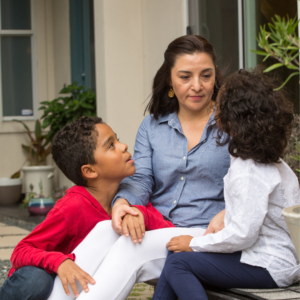Being a single mum can be incredibly tough. Especially, when you’re facing the rollercoaster of emotions that comes with separation or divorce. You might be feeling overwhelmed, alone, angry, scared, embarrassed, or even guilty.
Grief isn’t just for the loss of a loved one. It’s a natural response to any significant change, and the end of a relationship, especially one with children involved, is a major one. You might be grieving the loss of your dreams for the future, the family unit you envisioned, or even the sense of security you had. And you might be wondering, “Is it okay to feel sad, angry, or scared when my kids are depending on me?” The answer is a resounding YES.
Here’s the truth: These feelings are all valid, and pushing them down won’t make them disappear. It’s important to acknowledge and honour all your emotions – the good, the bad, and the downright ugly. In fact, they are a natural part of the grieving process, and pushing them down can actually hinder and delay your healing and grief recovery journey.

Here’s why allowing yourself to feel is so crucial for grief recovery:
As single mums, we often feel immense pressure to be “strong” for our kids. We bottle up our emotions, fearing that showing vulnerability will break us or burden them. However, pretending everything is okay does a disservice to both us and our children. Imagine stuffing all our emotions into a backpack – anger, sadness, fear, guilt… The weight of that backpack will slow us down and make it harder to move forward.
- Validation of your experience: Acknowledging your emotions is the first step in validating your experience. It’s important to recognise that your feelings are real and justified, no matter how overwhelming or contradictory they may seem. This validation is crucial for your self-esteem and mental well-being.
- Emotional processing and release: Bottling up emotions can lead to increased stress, anxiety, and even physical health issues. Allowing yourself to feel and express your grief, and other emotions, helps release this emotional tension. It also helps you process the pain and move forward.
- Understanding your emotions: When you acknowledge your feelings, you start to understand them and what you’re going through. Are you angry at your ex? Sad about the life you imagined? Grieving the loss of a sense of security? Identifying these emotions is an important part of grief recovery and helps you navigate this challenging time.
- Setting a healthy example for your kids: They’re watching, mamas! By allowing yourself to feel, you’re showing them that it’s okay to have difficult emotions. You’re also demonstrating healthy coping mechanisms for dealing with those feelings.

So, how do we honour those feelings and allow ourselves to grieve in a healthy way?
Here are 10 tips:
- Acknowledge what you’re feeling. Don’t judge yourself for experiencing emotions you might consider “negative.” It’s okay to feel angry, frustrated, or even scared. Give yourself permission to feel.
- Find a safe space. Find a safe and private space where you can freely feel and express your emotions without judgment. This could be a quiet room in your home, a peaceful spot in nature, or even the pantry #IYKYK.
- Express yourself. This could be through talking to a friend, therapist or coach, or joining a support group. Sharing your experiences with others can provide comfort and perspective, reminding you that you are not alone on this journey. You could also experiment with creative outlets like painting or dancing. Journaling can also be a powerful tool for processing your feelings. Release those emotions in a healthy way.
- Mindfulness and meditation. Practices like mindfulness and meditation can help you stay present with your emotions without becoming overwhelmed. By observing your feelings without judgment, you can gain clarity and calmness, making it easier to process difficult emotions.
- Engage in physical activity. Engaging in physical activities such as yoga, walking, or dancing can help release built-up emotional energy. Movement allows your body to process emotions and can be incredibly therapeutic during times of intense grief.
- Don’t be afraid to cry. Tears are a natural way to release emotional pain. Crying doesn’t make you weak; it makes you human.
- Feel the anger: It’s okay to be angry! But find healthy ways to express it. Hit the gym, write in your journal, or try creative outlets like painting or dancing.
- Practice self-care. Take care of yourself, mama! Eat nutritious food and get enough sleep. Make time for activities you enjoy, even if it’s just a few minutes a day. When you take care of yourself, you’ll be better equipped to take care of your kids.
- Set boundaries. It’s okay to say “no” sometimes. You can’t pour from an empty cup.
- Be kind to yourself. Grief takes time. There will be good days and bad days. Don’t expect to “get over it” overnight. Give yourself space to heal at your own pace.
Here’s the bonus: By allowing yourself to grieve and process your emotions, you’ll actually be strengthening yourself. You’ll be better equipped to handle the challenges of grief recovery AND single mum life.

Expressing Your Emotions in Front of Your Kids
Giving yourself permission to feel and express your emotions doesn’t mean unloading on your children. However, being honest about your feelings can actually build a stronger connection with them.
Here are some tips:
- Use “I” statements. Instead of saying, “You make me so frustrated,” try, “I’m feeling frustrated right now.”
- Normalise emotions. Let your kids know it’s okay to feel sad, angry, or scared. Don’t worry if you cry in front of your kids (it won’t scar them for life!). Explain that you’re feeling sad and that crying helps you feel better.
- Encourage open communication. Create a safe space for your children to express their emotions too.
Remember, by allowing yourself to grieve, you’re not just healing yourself, you’re also teaching your children valuable lessons about emotional intelligence and healthy coping mechanisms.

Final words…
Here’s the thing: You’re not alone in this. There are resources available to help you navigate this grief recovery journey. If you’re feeling overwhelmed by grief, co-parenting challenges, or a lack of self-esteem, I’m here to help. Reach out and let’s explore how I can support you on your path to healing and a brighter future.
Remember mama, grieving isn’t linear, and it’s okay to have setbacks. You might have good days and bad days. That’s perfectly normal. Be patient with yourself, honour your feelings, and know that with time and support, you will heal and you’ll be setting the stage for your own personal transformation and a brighter future. What’s important is that you continue to honour your feelings and trust in your ability to heal.
P.S. DID YOU KNOW?
Thrive Tribe – the global membership experience for single mothers – will be opening again very soon! Join the waitlist here.
PLUS You can book one-on-one coaching with Julia Hasche from wherever you are in the world!
- Do you need clarity on whether you should leave your partner or not?
- Have you just parted ways with your partner, and feeling lost?
- Have you been single for a little while now and need assistance with getting your life back on track and feeling empowered?
Click HERE to read about coaching and to hear from some others who have gone through coaching programs with Julia, and book in here for your 30-minute complimentary Clarity Call.
The purpose of the Clarity Call is:
- For me to get to know you and understand an overview of your current situation and where you are at.
- For us to establish what you need assistance with to move forward.
- To see if we are both comfortable working together.

Know someone who needs to read this? Share it with them via the links below.
